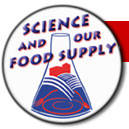 |
 |
||
| Food Safety Careers | December 2000 |
|
It's Real-life Science in Action!
So you want to be a scientist? Learn all about what it takes to make it happen by checking out these exciting interviews! Professionals working in a variety of food safety careers tell all about their jobs, exciting discoveries, and reveal their secrets for success!
Get Inspired!
Sixteen full-length interviews from people in a variety of food science careers
are presented. These will give you a taste of what a career in food safety is like.
Meet all these professionals below and follow the links on their names or photos to their interview pages.

|
Carolyn B. Brooks, Ph.D. Professor, Executive Assistant to the President, Research Director of Land-grant Programs, Dean "Research the various career opportunities in the sciences. There are many enjoyable areas, such as environmental science, food science, plant science, and meteorology, that are in high market demand, but are usually underrepresented by minorities and females." |

|
Christine M. Bruhn, Ph.D. Director of the Center for Consumer Research/Food Marketing "Follow your interests and get the skills you need to succeed." |

|
Bonnie Buntain, DVM, MS Assistant Deputy Administrator, Office of Public Health and Science "No matter your color, race, or disability, you can be anything you want to be." |

|
Theodore (Ted) H. Elsasser, Ph.D. Research Animal Scientist/Physiologist "Sometimes it's good to know that there is no right or wrong answer to how an issue turns out. You just need to be honest in the approach and ethical in stating the results." |

|
Jack Guzewich, RS, MPH Sanitarian/Epidemiologist "Don't limit yourself to one aspect of science - explore them all!" |
|
|
Roberta M. Hammond, Ph.D. Biological Administrator II "In this field, you have to be a good talker and a good listener, and you have to like it!" |

|
Jorge A. Hernandez, RS Senior Director of the Department of Science and Regulatory Relations "Find an area that instills a passion within you and dive into it." |

|
Farukh M. Khambaty, Ph.D. Microbiologist "Being a good scientist means a life-long commitment to keep growing and staying abreast of new developments." |
|
|
Arthur Liang, MD, MPH Director, CDC Food Safety Initiative "Be patient with your career development. Remember, the slow and steady win the race." |

|
Kevin Madsen Laboratory Technician "Working in science is being a part of the future. You have the ability to make things better for people around the world. And that's an awesome experience!" |

|
Art Miller, Ph.D. Lead Scientist for Research and Risk Assessment, Food Safety Initiative "To be in science, you must be goal oriented." |
|
|
Barbara Paul, Ph.D. Microbiologist "Don't think of math as an insurmountable mountain. Instead, approach the mountain at the base with what you already know and work your way around it to the top." |
|
|
Dr. Charles Sizer, Ph.D. Director, National Center for Food Safety and Technology "Good writing and communications skills are essential!" |

|
Morse Solomon, Ph.D. Research Leader Food Technology and Safety Laboratory "Trying to attack your road blocks can be an exhausting task. Instead, think of creative ways you can go over, around, or even under road blocks. In the end, you'll preserve your strength, positive attitude, and all the qualities you need to succeed!" |

|
Rene E. Sotomayor, Ph.D. Supervisory Research Biologist "Reading about the lives of famous scientists and how they succeeded can be incredibly inspirational." |
|
|
Anisha M. Williams-Campbell, Ph.D. Research Microbiologist "To investigate a mystery, a good detective always starts with the questions of 'how' and 'why'? These questions can be applied to microbiology." |
Hypertext updated by dav/bap 2001-MAY-03